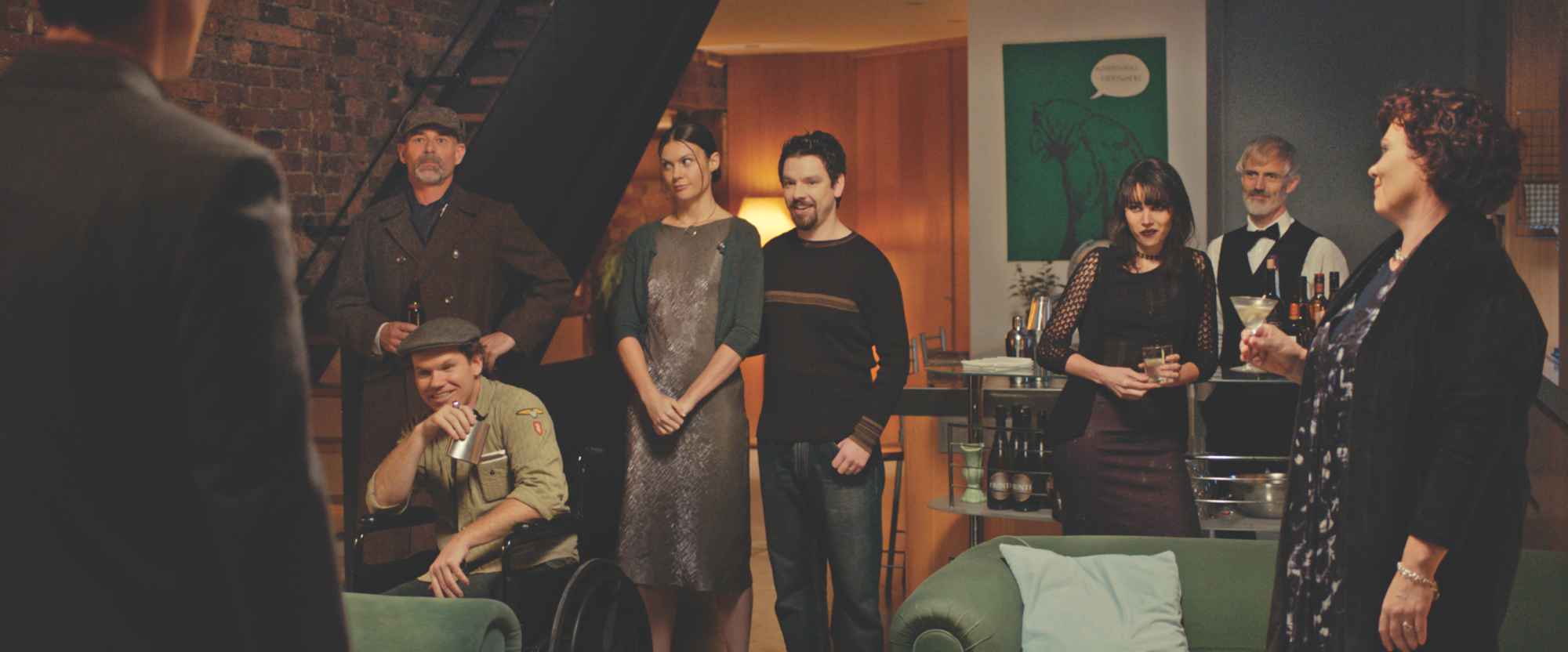There is nothing like a gathering of friends or family for a party in a film to ensure that things will not go according to plan (perhaps there is a basis for this in real life?). As I was watching and, later, thinking about Ashley Harris’ How Do You Know Chris? (2020), other titles kept coming to mind, including two well-known Australian ventures into this prickly territory: Don’s Party (Bruce Beresford, 1976) and, more recently, Palm Beach (Rachel Ward, 2019).
Don’s Party, derived from David Williamson’s 1971 play of the same name, involves a mix of people, some of whom know one another and some who don’t. The catalyst for their get-together is the 1969 Australian federal election, which was won by Liberal Party incumbent John Gorton despite a serious challenge from the Labor Party opposition, led by Gough Whitlam. Conflicting political allegiances become apparent among the guests at the party, and these become increasingly complicated as the night wears on through sexual banter and overtures that lead to some very fractious exchanges, verbal and physical.
In Palm Beach, the occasion for the reunion is Frank’s (Bryan Brown) seventieth-birthday celebration, which, set in his plushy pad in the affluent Sydney suburb that gives the film its title, brings together the members of the band he once managed, their partners and children of various parentage. Once the initial hugs are done with, the sources of potential conflict start to emerge, and as in Don’s Party there are elements of sexual tension and issues from the past that give rise to certain expectations, some of which are met and others, not.
‘What sort of people are coming?’ asks one guest of her host, Don (John Hargreaves), in Beresford’s film, a question echoed in so many words in the very title of How Do You Know Chris?. In the case of Harris’ film, this link is the primary factor in the presence of a diverse gathering of people in a Melbourne apartment in the year 2000 – some of whom have a shared past, some of whom are meeting for the first time, but all of whom have had some connection with the titular host. When Williamson wrote the original iteration of Don’s Party, he was interested in ‘ongoing real-time action […] and thought a party would be an interesting thing to put on the stage’.[1]David Williamson, quoted in Brian McFarlane, ‘Men Behaving Badly: Don’s Party’, Metro, no. 154, 2007, p. 98. The 1976 film doesn’t quite aspire to this, but Harris’ feature, adapted from a script by Zachary Perez, comes very close to playing out in real time – there is a short pre-credits sequence and an even briefer postscript – and, in doing so, creates a pervasive sense of the party’s continuity and gathering tension.
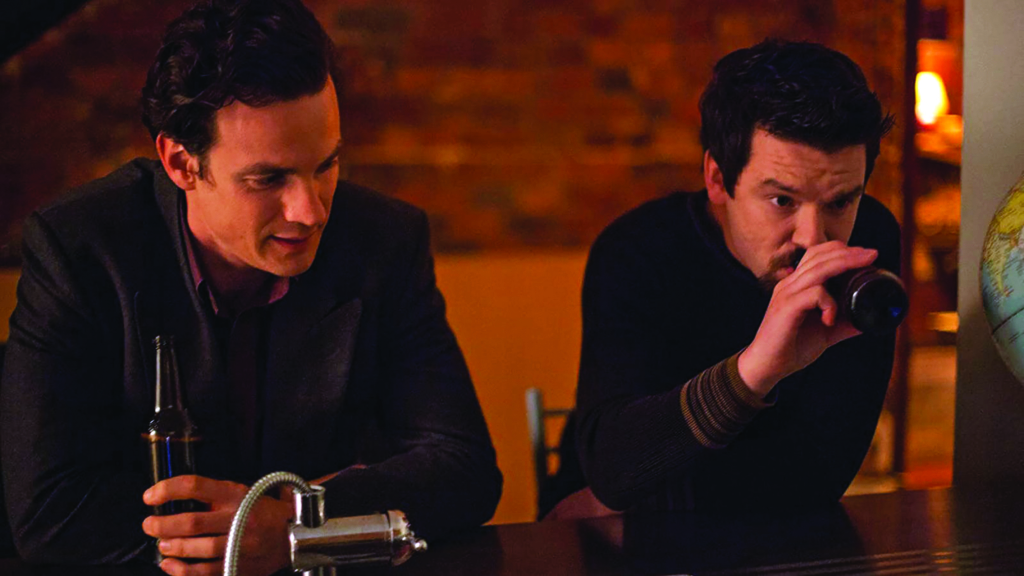
Don’t expect a lot of classic Hollywood cause-and-effect narrative leading to a closure that wraps everything up satisfactorily in Harris’ film. What you get instead is a lot of sharply observed interplay among people and knowledge that comes to the surface as the night wears on, with differing results.
The film opens with the You Am I song ‘Berlin Chair’ pounding on the soundtrack as the camera moves in on a young woman on a bus, which she leaves to go to a laundromat. This character, Emi (Tatiana Quaresma), soon strikes up conversation there with another customer, Chris (Luke Cook); when asked what he is jotting down, he tells her, ‘I’m writing a suicide note’ – a remark we seem meant not to take seriously, but that will echo through the film. There is obvious attraction between the pair, and he invites her to a party to be held at his place that night. This all happens prior to the opening credits, after which Emi meets another couple standing outside the address she’s been given, and the premise of diverse people arriving as guests is set in motion.
So who is Chris, exactly? As the other guests gradually arrive at his rather smart apartment (Chris’ inheritance?) – complete with drinks bar, a waiter (Lee Mason) serving classy food and cocktails, table tennis, and pinball machine – they make tentative overtures to each other. These attempts often end with the query in the film’s title: ‘How do you know Chris?’ The subject of that enquiry, however, is nowhere to be seen. We may be left to wonder why this is so: why does the film introduce us to these guests in advance of Chris, whom we’ve only fleetingly but – as it turns out – significantly met in the laundromat?
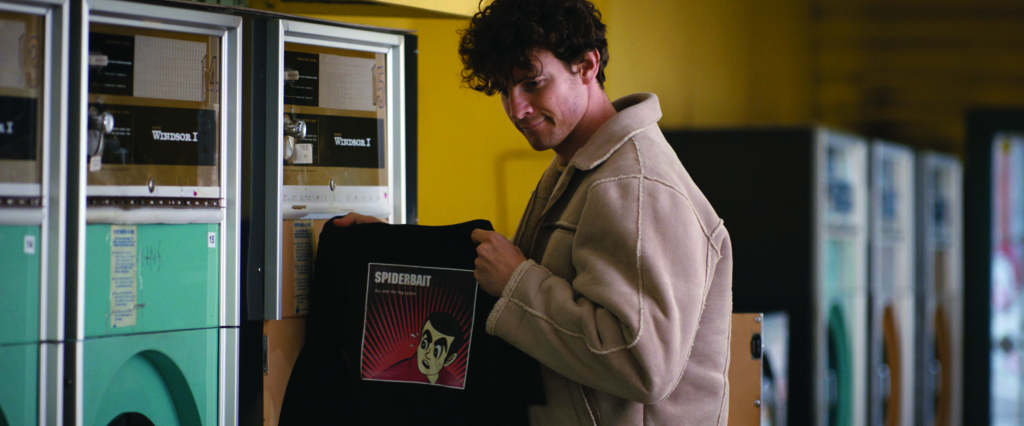
The answer is that delaying Chris’ entry at his party gives us convincing opportunities to find out more about him than we would have if he were there from the start. Some of the guests have known him since high school days: Shane (Stephen Carracher), who has come dressed as Sherlock Holmes, seems to have been a mentor for Chris back then; at least one other guest knew him during his spell in the UK; and the most recent acquaintance, of course, is Emi. There is also a suggestion of ex-lovers and people with other complex relationships – and when Chris finally arrives, certain old conflicts make themselves felt, along with cultural changes that have occurred over the intervening period.
Examples of such changes include those relating to sexual matters – or eating habits. Regarding the latter, there is talk of our being ‘supposed not to eat meat’, which of course resounds with the rise of vegetarianism (and, more recently, of veganism). One guest who refuses to go along with this dismisses it as ‘hippie talk’, implying its heritage in radical 1960s views. There is a real sense of distinction within the ensemble, which comprises two couples and several singles, the latter being inclined to intervene among the former.
By the time the host arrives, about thirty minutes into the film’s running time, Perez’s screenplay, Harris’ subtly unshowy direction and a cast mostly new to feature filmmaking have collectively created an air of anticipation.
The first couple Emi meets outside Chris’ apartment consists of the formally dressed Mike (Travis McMahon) and the glamorous Dot (Lynn Gilmartin), later referred to by Shane as ‘[James] Bond and his floozy’. Mike is of a somewhat reserved, possibly repressed, demeanour, while Dot is more outgoing; upon joining the gathering, they are accosted by the formidably argumentative vegan Christal (Rachel Kim Cross), who talks of Mike’s time in the UK, implying a same-sex relationship there with ‘Frank’, as Chris was apparently then known. The other couple, Justin (Jacob Machin) and Claire (Ellen Grimshaw), schoolfriends of Chris’, are enjoying a game of Guess Who? when they are interrupted by another contemporary, the wheelchair-bound Blucker (Dan Haberfield), whose unrestrained badinage will lead to later disruptions, verbal and physical.
While we are getting to know these guests, Emi stands apart, having only come to ‘know Chris’ a few hours ago. By the time the host arrives about thirty minutes into the film’s running time, Perez’s screenplay, Harris’ subtly unshowy direction and a cast mostly new to feature filmmaking have collectively created an air of anticipation around how Chris will respond to these figures from his past.
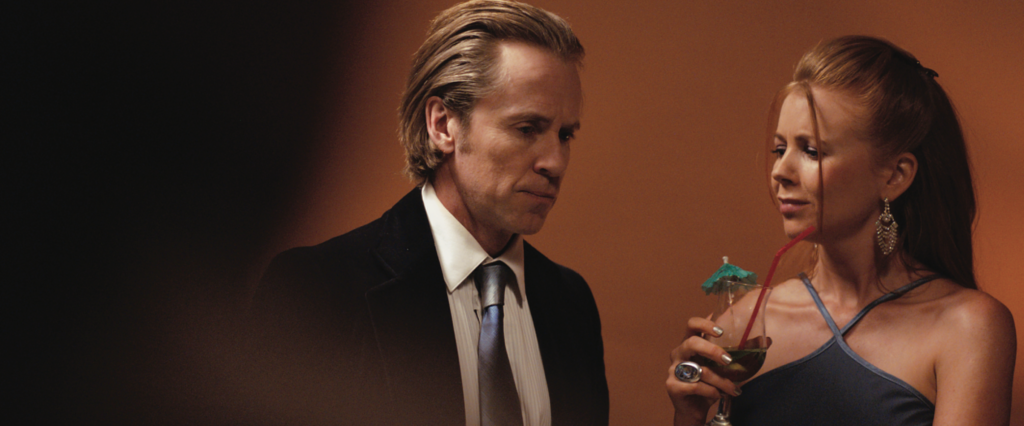
The narrative is gently pushed along as Chris makes his way around the party to greet his guests. A warning he gives to the loquacious Blucker – a former footballer who now has his eye on the Paralympics – that he’d ‘better lay off the piss and the smokes’ reminds us of the cigarette poster on display in the apartment, designed by Chris’ dad, who, we’ve previously been told, died of lung cancer. This connection is never spelt out, but makes a quiet contribution to the texture of the film, suggesting some of the ways in which the past has impinged on the present.
After greeting the more mild-mannered Justin and Claire, Chris goes upstairs to the bathroom, where Mike soon joins him. Through Patrick McCabe’s deft editing and Mark Morris’ cinematography – which has hitherto prioritised close-ups – a tension is created as the camera moves between the actual faces and mirror images of the pair. Somehow, the shifting camera reinforces – even creates? – the sense of uncertainty that hovers over this relationship. Chris grabs Mike and tries to kiss him, but is met with Mike’s resistance and mention of ‘a girlfriend’. Like the film as a whole, this episode is articulated without any melodramatic excess; it simply makes its point about the pair’s previous relationship and Mike’s unwillingness to resume it.
A more positive moment in Chris’ assessment of past relationships is that in which he thanks Justin for being a ‘true friend’, recalling how his schoolboy loyalty helped him deal with his father’s death, in contrast with the larrikin Blucker, who was ‘merciless’. And so the film’s network of once-connected lives persists; a while after a rooftop sexual interlude with Emi, Chris turns his attention to Christal to explain why he became ‘angry’ with her: ‘You were a junkie, and I was a depressed Peter Pan.’
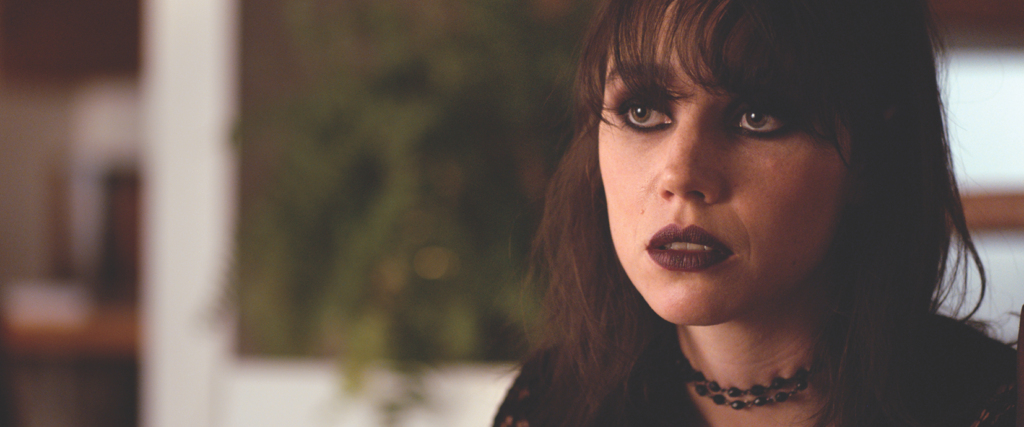
All of these episodes and more lead to the moment in which Chris addresses the party at large. By now everyone expected, including his mother, Amanda (Susan Stevenson), has arrived and been greeted by Chris with varying degrees of affection. In his address, he assures them, ‘You’ve all had an impact on my life,’ recalling how Blucker ruined his time at school and how Shane was ‘like a father’ to him, and weeping as he turns to his mum. One of the film’s strengths lies in the quiet but, in retrospect, unmissable way it prepares us for its tragic end – and the word ‘tragic’ seems almost to overstate the routes by which Chris ends it all.
One of the film’s strengths lies in the quiet but, in retrospect, unmissable way it prepares us for its tragic end.
And this ending, poignant as it is, causes one to reflect back on the ways in which it has been prepared for: Chris’ sexual ambivalence; his father’s long-ago death; the schooldays made painful by Blucker’s verbal bullying; and so on. What we have seen is a network of recollections and relationships that are somehow knitted together to provide a kind of emotional landscape involving those who ‘know’ Chris in their individual ways.
In a fleeting postscript, a title announces that six months has passed as Emi (who has been played with quiet charm and assurance throughout by Quaresma) is seen walking in a daylit street and dropping coins into a busker’s bag. What does this suggest about her, about what she may have learned from ‘knowing’ Chris? That’s up to the viewer to ponder; this is not a film that spells out its meanings explicitly – perhaps in acknowledgement of the fact that life, too, doesn’t do that.

*
I came to this new Australian film more or less in a state of ignorance. The names of those before and behind the camera were nearly all new to me: it’s the first feature for director Harris and screenwriter Perez, each of whose preceding work has been in shorts or TV productions, a background shared by most of the cast. Cook’s performance as the likeable, wary Chris provides the rallying point this quirky, admirable film needs, and indeed the cast as a whole makes persuasive use of the insights and individualities Perez’s screenplay has given them to work with.
Films don’t have to depend on clear-cut narratives, let alone lavish CGI effects, to hold our attention. Skilfully directed, written and acted observation of the interplay of people in an ambivalent situation can be – and, here, is – just as absorbing. There are moments when old wounds surface, when relationships are up for reappraisal, when backstories emerge – for better or worse – and the overall effect is one of lives under scrutiny.
How Do You Know Chris?, which was given a low-key theatrical run late last year, only had limited screenings and deserved more. I look forward to seeing more from the filmmakers involved.
https://www.howdoyouknowchris.com.au/
Endnotes
| 1 | David Williamson, quoted in Brian McFarlane, ‘Men Behaving Badly: Don’s Party’, Metro, no. 154, 2007, p. 98. |
|---|
